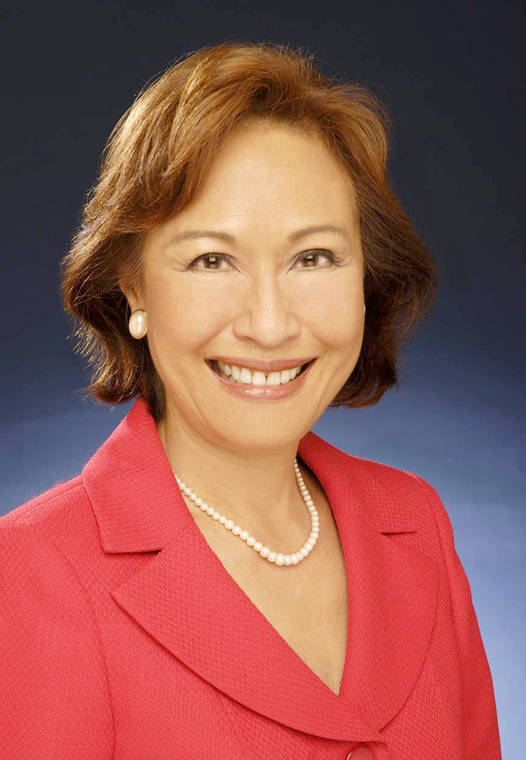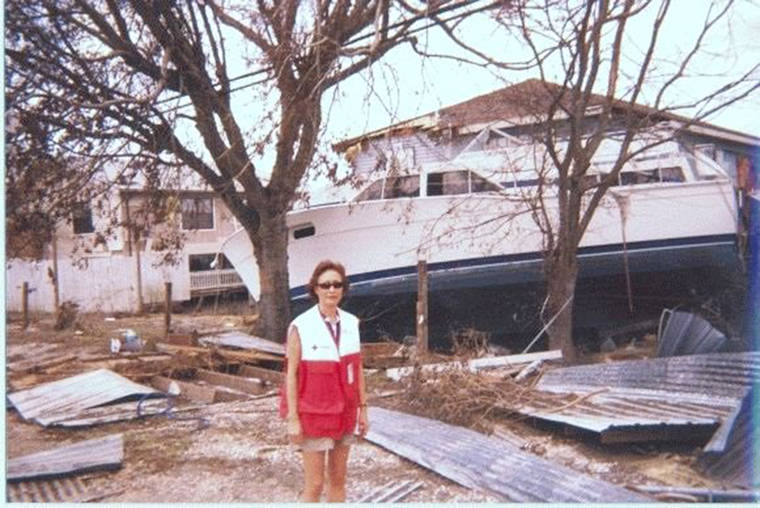When Coralie Chun Matayoshi arrived as CEO of the American Red Cross of Hawaii in 2003, she found the revered organization wasn’t doing too well.
And that’s putting it mildly.
It was facing a $200,000 deficit and had just let several staff members go. Morale was low and public awareness of just what it was exactly that Red Cross did in Hawaii was low, too.
Matayoshi, an attorney, took decisive action.
“I knew we needed to start raising money,” she said. “You can only cut so many expenses. When you don’t have any money in the coffers, you have to raise money quickly.”
She also knew she had to change the perception of Red Cross. The public took it for granted Red Cross had endless resources.
“People think the Red Cross is a rich organization, that we must be funded by the government or get help from the mothership on the mainland,” Matayoshi said.
Wrong.
American Red Cross of Hawaii wasn’t rich. It wasn’t funded by government. It did not get money from big brother back home.
“The only time the national organization gets involved in our operations is when have really, really big disasters,” she said. “Otherwise, we are on our own.”
Red Cross relies on the community, so Matayoshi set out to improve that support.
She did it — giving thanks and credit to a strong but small staff and a large and spirited team of thousands of volunteers.
“We had to build the organization from the ground up,” Matayoshi said.
Her first few years, work was pretty much 24/7.
“It was like being in litigation and going to trial. You don’t sleep or eat,” she said, laughing.
Her persistence paid off.
In 2013, she was named CEO of the Pacific Islands Region, which includes Hawaii, Guam and Saipan.
Today, American Red Cross of Hawaii is sound financially. It has strong corporate support and has a core of volunteers statewide.
Which, ironically enough, makes it a good time for her to retire.
At the end of this year, she will step down. A search for a new leader is underway.
“I feel like I’m leaving it in a good place,” she said. “Red Cross has a good reputation and presence in the community now, where I don’t know if it had before.”
Matayoshi says she is at a great point in life. Her husband is retired, their three children are grown, and they are looking forward to traveling, tennis, sunsets and volunteering.
Matayoshi has served as an attorney, judge, and head of several other statewide nonprofits. She previously said that serving as the CEO of the American Red Cross Pacific Islands Region “has been truly extraordinary and the Red Cross will always have a special place in my heart.”
She will be using her legal background when she hosts weekly podcasts on aspects of the law beginning Jan. 13 on channel 2. Her first guest will be Sen. Karl Rhoads on the upcoming legislative sessions.
Her goal is to answer “common legal questions” people have, such as what happens if you die without a will, or how to be sure to pass your home down to your children.
“It will be a good public service,” she said.
When you meet Matayoshi, she is friendly, warm, encouraging and engaging. But she doesn’t get so much done on personality alone. Her background is distinguished and impressive. Consider some of her titles and achievements:
w She previously served as a part-time District Court Judge for the State of Hawaii, Executive Director of the Hawaii State Bar Association for 13 years, Trial Attorney for the United States Department of Justice Antitrust Division, and Special Assistant United States Attorney in Washington, D.C.
w She also worked for several years in private practice, served as chief policy analyst for the State Senate Committee on Business Development &Pacific Relations, and as executive director of the Hawaii Institute for Continuing Legal Education.
w She is a graduate of Punahou School, earned a political science degree from the University of California, Berkeley, and received her juris doctor degree from Hastings College of the Law.
w In 2010, she was named by the Pacific Business News as Businesswoman of the Year (nonprofit) and has won numerous awards from the U.S. Department of Justice, Hawaii State Bar Association, and Hawaii Visitors Bureau.
w She served five years on the University of Hawaii Board of Regents, including four as chair of the Personnel Committee, and is currently on the Hawaii Visitors &Convention Bureau Board of Directors and Diamond Head Theater Community Advisory Board.
There’s more, but you get the idea.
Matayoshi is sharp, motivated, ambitious and was the perfect choice to lead Red Cross in Hawaii. She took steps others would might avoided. For instance, She rallied military and first responders to literally go out on the streets and ask for donations for Red Cross.
It was a huge success.
“That kind of showed we did need money,” she said.
Then, Red Cross received little corporate support. A decade ago, Matayoshi started a corporate partner program that today has 80 members who give nearly a million dollars.
“We’re engaging companies and their employees in the mission of the Red Cross,” she said. “If you give employers an opportunity to engage, they are more likely to support you, so they become part of us and our mission.’
She points to the “Sound the Alarm” program where Red Cross volunteers install free smoke detectors in homes and notes it has saved nearly 700 lives.
“That’s a lot of lives in five years,” she said.
Red Cross tended to be “shy” about seeking publicity for its actions in helping people and tended to not send out press releases. Matayoshi changed that, too.
“We made sure we sent press releases. People had to know we were responding to disasters,” she said. “If they don’t hear about it, they don’t believe you.”
Matayoshi said she’ll miss the people, the volunteers who are so passionate. She appreciates the donors, “who give with their hearts.”
She’ll never forget her trip, in 2005, to help in Louisiana following the destruction brought by Hurricane Katrina. When a reporter learned she was from Hawaii, he asked why she came from so far away.
Red Cross, she told him, has been there for people in Hawaii, so she wanted to be there, no matter the distance, for others.
“I just wanted to pay it forward. I knew people would come for us, like they did at Iniki,” she said.
Her advice to her successor is simple: Be flexible and be appreciative of your staff and volunteers. Immerse yourself in Hawaii’s history.
She called it privilege to represent Red Cross as it marked its 100-year anniversary in 2017.
“Our mission is timeless. It’s helping people at the lowest time in their lives, when they are hit by disaster,” she said.
Red Cross is full of people who have an innate desire to help others and she’s proud to be among them. She feels blessed that Red Cross gave her the opportunity to live her passion and make a difference.
“It’s just been an honor to represent an organization with such an awesome mission,” she said.






